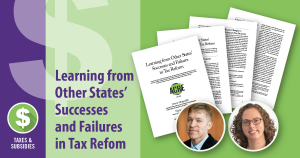After Arkansas: The Road Map to Tax Reform was published, many Arkansans wanted to know: are these reforms even possible? Have any other states tried these reforms? The answer to that question resulted in this research paper, which goes into detail on the many reforms other states have done that are very similar to what was written about in Arkansas: The Road Map to Tax Reform and what is being debated in Arkansas. These other states include Utah, North Carolina, Indiana, the District of Columbia, and Kansas. The details and stories from this research paper describing what other states have experienced when passing tax reform culminate in several important lessons that can help Arkansans understand the possible results of tax reform. This research paper, Learning from Other States’ Successes and Failures in Tax Reform, was written by ACRE Scholar and UCA Assistant Professor Jeremy Horpedahl and Tax Foundation Director of Special Projects Nicole Kaeding.
One of the key lessons that emerged from looking at other states is that sensible tax reform can be successful even in the worst circumstances. Utah passed several tax reforms just prior to the Great Recession, but because these reforms were carried out in a prudent manner, the state did not suffer any additional effects from the Great Recession. Utah lowered rates, broadened the tax base, and made sure the cuts were revenue neutral, and this resulted in tax reform working even through a rough business cycle.
Another lesson is that tax reform doesn’t have to happen all at once. Indiana’s path to tax reform is a great example of that. Over a six year period, Indiana passed numerous changes to their tax code, including lowering the corporate and individual income tax, allowing local governments to lower their personal property tax, creating a taxpayer rebate program, launching a tax incentive review process, and raising its gasoline tax to fund a long-term transportation plan. Indiana sets a good example of how sensible tax reform can be spread out over many years.
Kansas’s reforms teach us an important lesson as well. Kansas decided to pass tax reform that was not revenue-neutral. Most other state tax reform efforts mentioned had a combination of tax base broadening and lowering rates as a way to keep the changes revenue neutral, but Kansas decided to lower rates without broadening the base, causing budget shortfalls and problems funding programs. Kansas teaches us that cutting taxes without regard to sound tax policy or spending priorities can be disastrous for a state’s budget.
Tax reform can work, if done responsibly and with regard to sound tax reform policy.
If you want to read other research on this topic, you can view our page here.

